Siem Reap Photo Guide: Things You Must See and Capture
Siem Reap is a popular travel destination in northwestern Cambodia. Being a gateway to the Angkor Archeological Park, Siem Reap and the nearby countryside have so much to see and photograph. After spending a week there, we came home with beautiful photos and memories that we would never forget.
This blog post is the first in a series of posts about traveling and capturing photogenic scenes in Siem Reap. We took a private photography tour and our guides were professional photographers who have lived in Siem Reap for a long time. We saw and learned a lot from the trip and want to share with you our one-week journey in Siem Reap. This Siem Reap travel guide is about places you should visit and things you should do that will offer great photo opportunities.
Spectacular Angkor Temples
No trip to Siem Reap is complete without visiting some of the Angkor temples. We visited 7 temples and they are very charming in their own ways.
If you want to see the popular ones such as Angkor Wat, Bayon, Ta Prohm or Banteay Srei, it’s best to be there when they open or late in the afternoon. By coming early, you can snap some photos with no one in it while enjoying a peaceful atmosphere. You can then spend mid-morning or mid-afternoon at less popular and quieter temples which are also very beautiful.
Ta Prohm is the most photogenic temple among the ones we visited, so it’s definitely a must see in Siem Reap. Trees have grown out of the ruins for hundreds of years, and their vast roots intertwine with the walls and towers of Ta Prohm.
Our guide called the first photo below “the impossible photo” because it can be difficult to shoot it with no one in the frame. If you come early, you will have a great chance at it with some patience. Photography tip: the passages at Ta Prohm are usually narrow so a wide angle lens like a Canon 16-35mm f/4L lens will make it easier to capture photos.
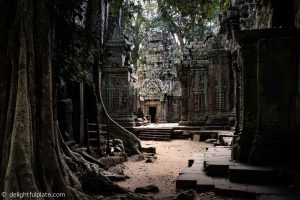
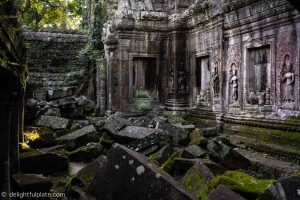
Beautiful Carvings
It’s easy to be captivated by how grand and magnificent Angkor temples are, but don’t forget to examine intricate carvings at each temple closely.
I couldn’t get enough of the carvings at Banteay Srei, a temple built from red sandstones. Every inch of stone surface is covered with elaborate decorative carvings. Banteay Srei is one of the smallest temples in the area but it is a definitely a must see.
Photography tip: since you cannot enter the central sanctuary at Banteay Srei, it’s best to have a long lens to capture the exquisite carvings and statues here. The first photo below was taken with a Canon 100mm f/2.8L macro lens and the second one was taken with a Sony 55mm F/1.8 lens
.
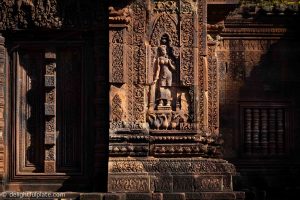
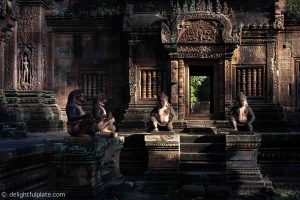
You shouldn’t leave Siem Reap without at least one picture of the smiling faces carved into stones at Bayon temple. There are about 200 faces at the upper level of this temple.
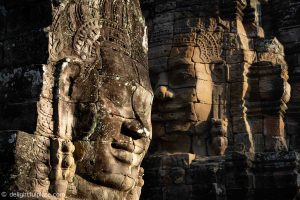
I also enjoyed taking photos of beautiful carvings at Ta Prohm and Banteay Kdei because of how colorful they are. They usually have some parts in green and pink shades. Follow the lights and look for statues or carvings that are spotlit by a sunbeam – they are great photo opportunities you should not pass.
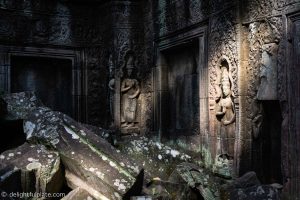
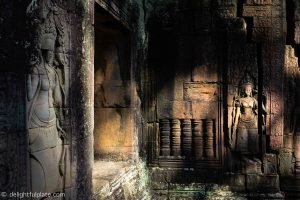
Sunrise and Sunset
Angkor Wat is the most famous temple in the Angkor Archeological Park. Watching the sunrise at Angkor Wat is an iconic experience in Siem Reap and depending on the sky and weather, you can snap some very impressive shots.
Millions of visitors watch and capture Angkor Wat and its reflection over the pond during sunrise every year. If you don’t want to be in the crowd, you can stand further away and still have very nice pictures of the scene. You may need to bring a tripod if you want to take photos of the sunset with your DSLR camera.
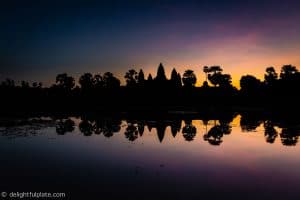
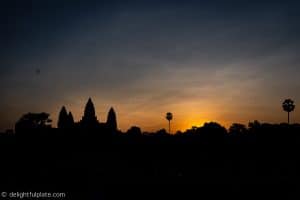
Pre Rup temple is a popular sunset spot. On the side of the temple where you can see the sun going down over the jungle, it is often packed with tourists. You can go to the other side which has almost no one to take some really cool photos.
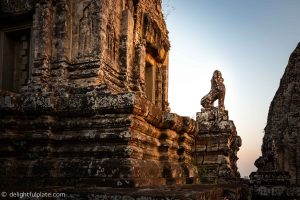
Watching the sunset on Tonle Sap lake is also relaxing. We took the photo below after a visit to Kampong Phluk floating village.
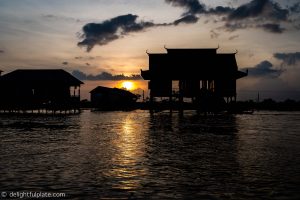
I also had a great time at Bayon temple in the late afternoon, near sunset. The upper level of Bayon is quite high, so don’t come too late. Otherwise, the sun will be too low and there won’t be any lights shining at the stone faces. What you want to capture here is the contrast between the faces in shadow and the faces lit by the golden late afternoon sun.
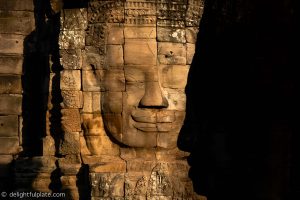
Pagoda and Water Blessing
Buddhism is the national religion of Cambodia and it plays an important role in both cultural and social life. We were lucky to witness a few Cambodian water blessing ceremonies during our trip. In the ceremony, a monk will be chanting while pouring water over the head of the people who receive the blessing. A beautiful experience to watch and photograph.
Photography tip: set your shutter speed high (like 1/400 or faster, depending on your lens) to capture the impressive water splashes and drops. Please ask the people who receive the blessing for permission before taking photos.
Our guide, a professional photographer, has lived in Siem Reap for years and knows the places and people very well. He took us to the kitchen of a pagoda where we could take photos of the monks in their daily activities. The monks in Siem Reap don’t seem to mind being photographed, but it’s always good to ask for their permissions and don’t take photos of them when they eat.
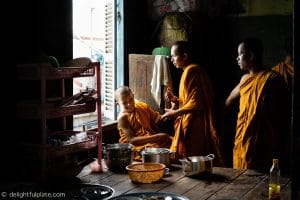
Cambodian Countryside Life
Siem Reap has grown into a lovely small town with lots of amenities of modern life. However, just travel out of Siem Reap for 15-30 minutes and you will see a completely different picture.
We spent some time in the countryside and visited some families who do traditional crafts such as making fresh rice noodles and rice wine. It’s sad to see that they earn very little money from selling their products. This family we went to makes rice noodles and earns a profit of only a few dollars a day.
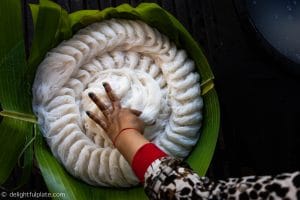
Cambodian Floating Villages
There are several floating villages near Siem Reap. The most authentic one, from what I read, is Kampong Khleang but it is also the farthest one. We went to Kampong Phluk and thought it wasn’t too bad. I got to see things I had never seen before.
The living conditions here have nothing similar to what I am used to. For a brief moment, I feel bad for the people living here but then who am I to judge their lives? I’m so grateful for the life I have after coming back from the trip. Anyway, if you go to Kampong Phluk floating village in the afternoon, you will be able to watch the beautiful sunset on Tonle Sap lake on the way back by boat.
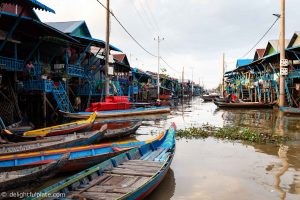
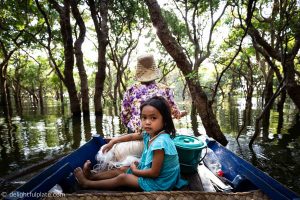
Cambodian People
In addition to being extremely kind and friendly, Cambodian people are also photogenic especially Cambodian children. We went to a local market in Siem Reap and got some photos of people there with beautiful facial expressions. Cambodian children look innocent and adorable in photos with their big eyes. I can see that adults, with lovely smiles, still have a little bit of shyness in front of the camera, but they are usually happy to let tourists take photos of them and their daily lives.
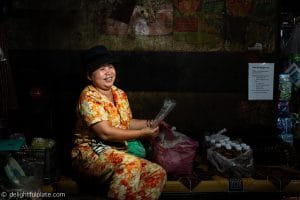
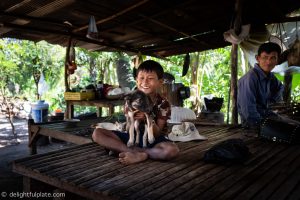
Khmer Food
Khmer food in Siem Reap is absolutely delicious. Every dish is so flavorful due to extensive use of herbs, spices and aromatics such as lemongrass, turmeric and lime leaves. Each plate of food usually contains different components with different colors.
If you enjoy food photography like us, I’m sure you will want to capture the beautiful presentation and deliciousness of Cambodian food. You definitely need to try fish amok as well as a few Cambodian curry dishes. I was so addicted to the fragrance and bold flavors of their curry. The best meals we had in Siem Reap were at Malis, Damnak Lounge and Embassy. You can find our guide for must-try restaurants in Siem Reap here.
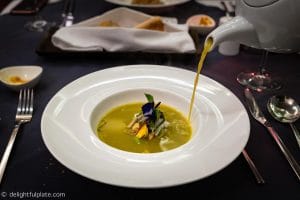
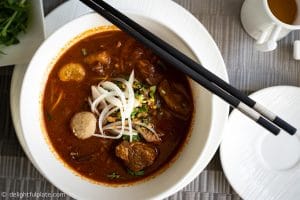
I hope you find this Siem Reap travel guide about things you must see and capture in Siem Reap, Cambodia, useful. The next part of the series will provide more details about the Angkor temples we visited and tips for an enjoyable visit as well as more detailed tips for taking photos there. For your information, below is the list of camera gear we used for the trip:

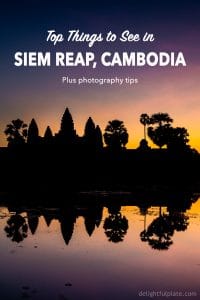
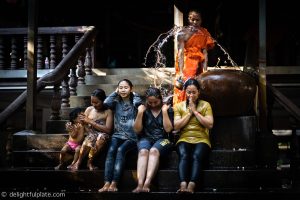
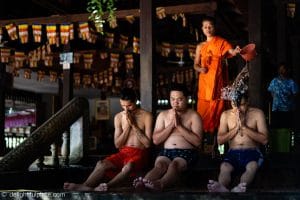
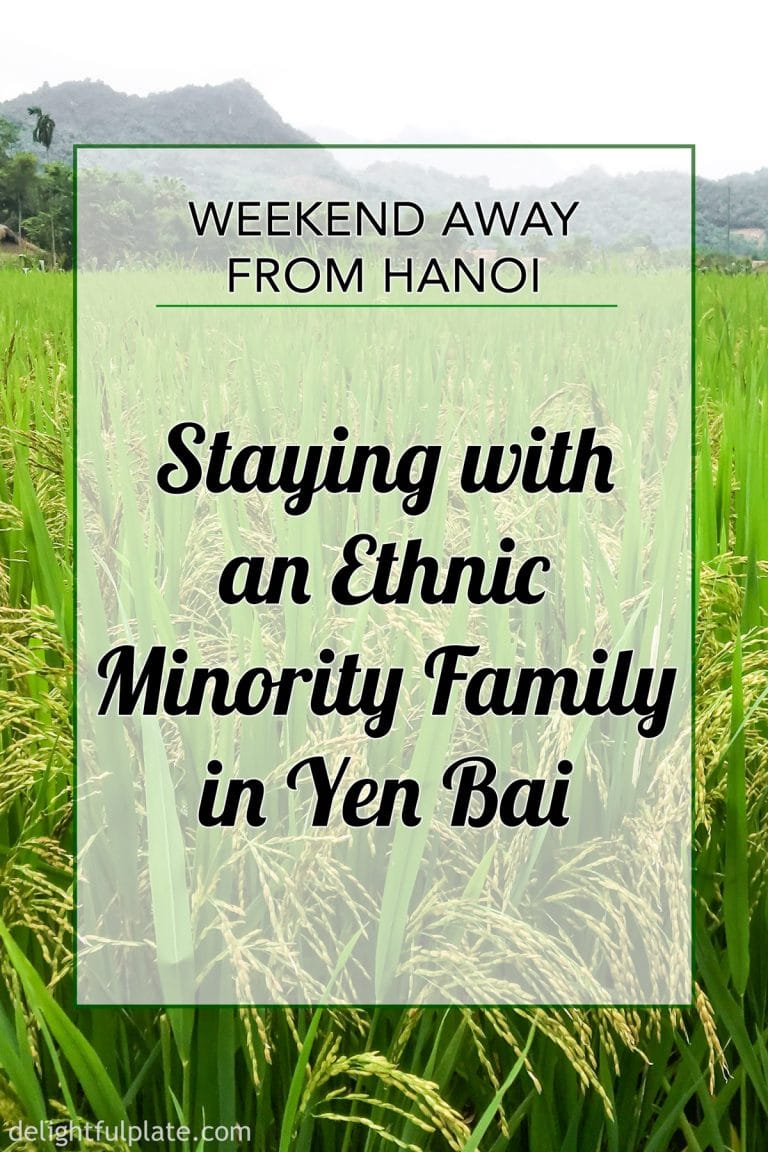
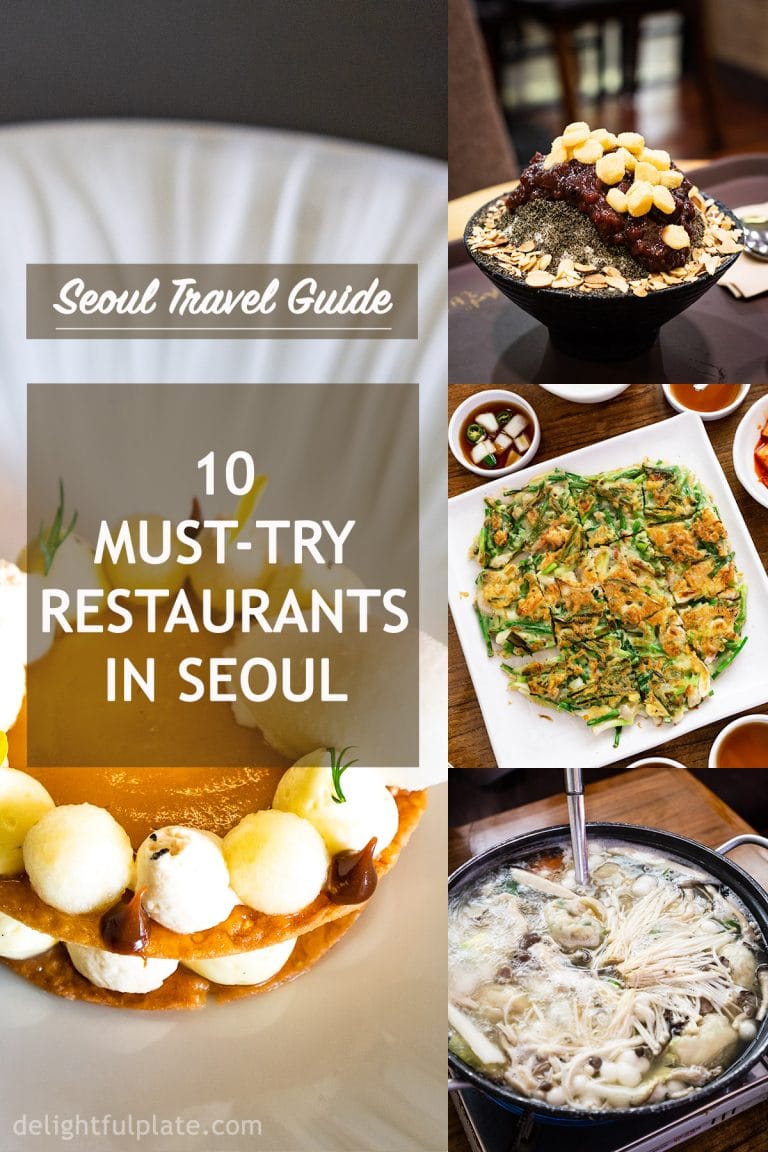


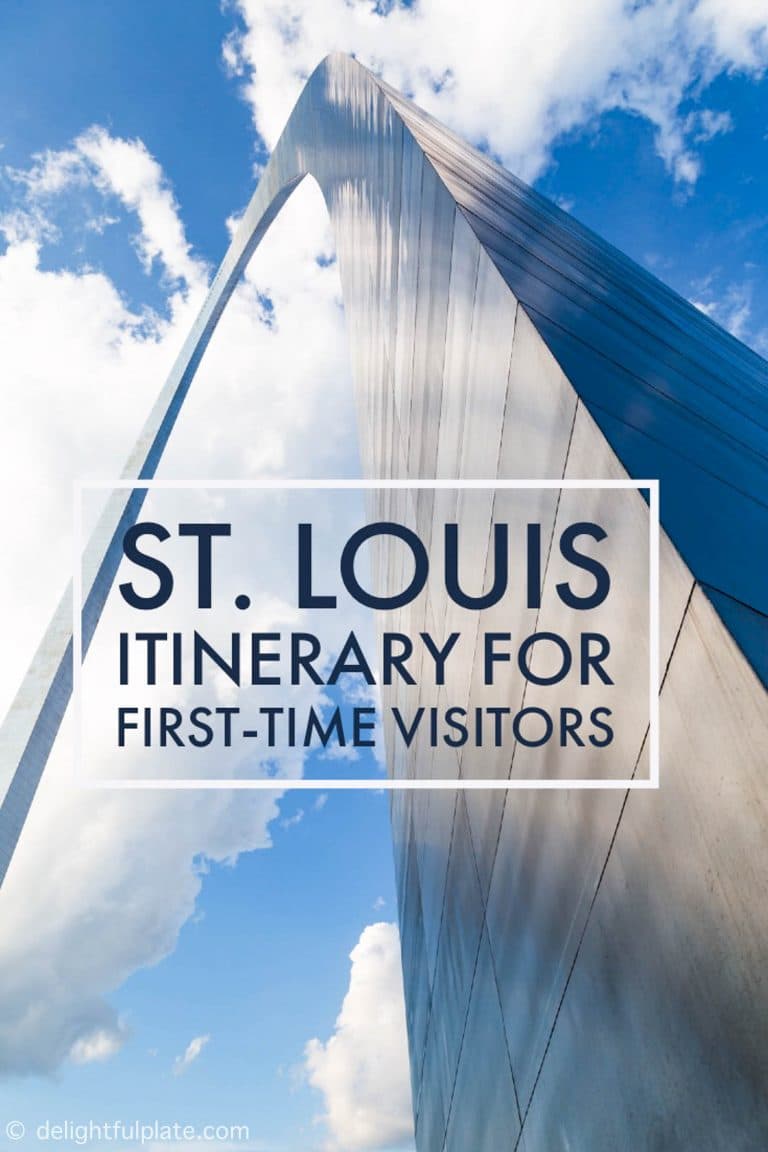
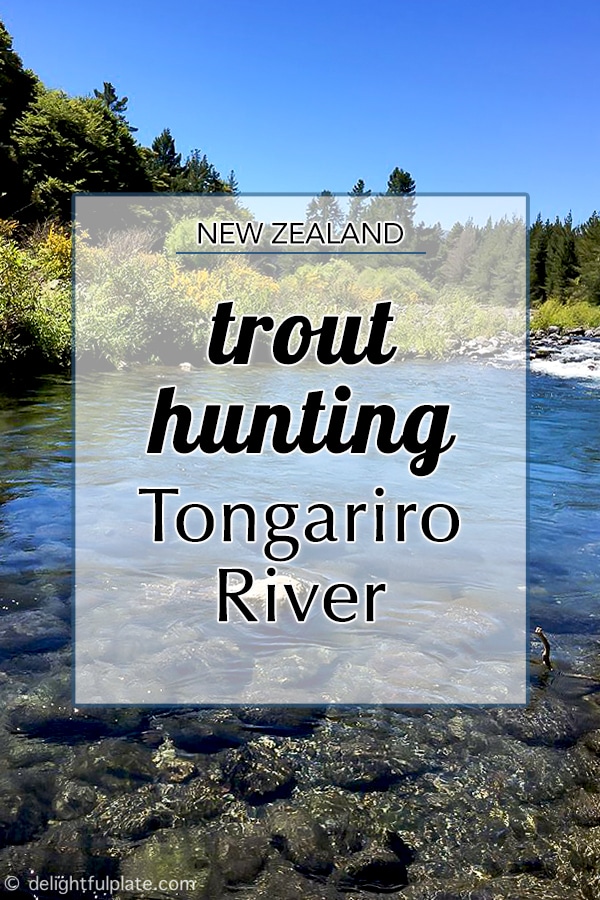
Amazing.
How did you find a photo guide?
Otroligt fint. Finns er guide fortfarande tillgänglig tror ni och isf hur hittar man hen?